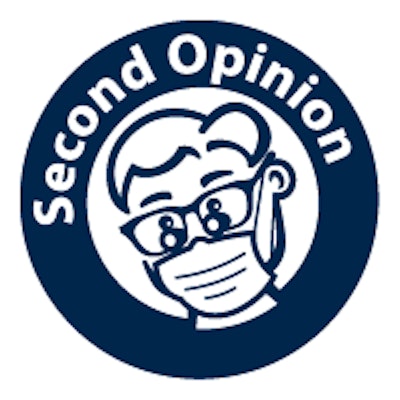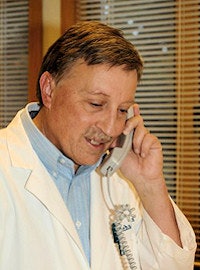
In the first of this two-part series, Dr. Davis explained how the present degree of dental Medicaid fraud, waste, and abuse is not sustainable and how it is slowly changing. Read that part here.
In reaction to the public's concern about the excessive abuse of child restraints, a number of Medicaid mills have jumped onto the conscious sedation bandwagon. The best option of treatment is to sedate in a hospital setting with IV sedation, a properly trained anesthesiologist to continually monitor the child's vital signs, with reversal medications at the ready, and the capability of nearly instantaneous airway resuscitation. Since Medicaid often doesn't pay adequately for hospital cases, the children's safety is too-often compromised.
 Michael W. Davis, DDS.
Michael W. Davis, DDS.
Too often, the dentist has little-to-no advanced life support training. A child going into shock from an adverse drug reaction already has tiny blood vessels in which to attempt to stick an IV line. Their airway is small and often further compromised by enlarged tonsils, with a natural anatomy that already appears anatomically constricted and funnel-like.
I won't say it's not feasible to do this care properly, but a doctor has to deliver conscious sedation (often involving multiple drugs) and monitor all vital signs, while simultaneously roundhousing sedated children with steel crowns and pulpotomies. However, under the present Medicaid program, there are huge financial disincentives to provide this style of care properly. Corners get cut and children get harmed, too often permanently.
So, what is the fallout for the dental profession? Certainly the negative press has added a degree of distrust from the public. Trust is difficult to obtain and easily lost. And once lost, it's even more difficult to regain.
Getting involved in the market
A number of interstate corporate dental Medicaid providers today are out, or are getting out, of the Medicaid program. Many corporate Medicaid clinics are closed or are in the process of closing. In fact, one large interstate practice management company has marketed the sale of Medicaid patient records (presumably from a large corporate Medicaid provider) to prospective private dentists.
A number of individual corporate Medicaid clinics are on the market, as well as entire companies, which are targeting sale to private dentists and other corporate investment banking groups. Unfortunately for them, the future of dental Medicaid is highly uncertain and sales are slow to nonexistent. Others are increasingly attempting to diversify into serving non-Medicaid patients.
How can individual private dentists and small business dentists profit from this time of market uncertainty within the Medicaid market, which was once so dominant and lucrative?
- Wait! Increasingly, we'll see high-quality used dental equipment on the market at record low prices. We'll see dental space offered fully equipped with all desired leasehold improvements of specialty electrical and plumbing. Both younger dentists and senior private practice dentists may profit from these future record bargains.
- Don't jump into "deals" that offer the sale of Medicaid dental practices. Generating the past revenues of these clinics may require clinical and business practices that could land you in jail.
- Don't purchase Medicaid patient dental records. Generating adequate revenues for a sound business under today's Medicaid requires that the same standard of care is delivered to all patients. One can no longer deny appropriate standard of care to Medicaid patients without serious risks. Plus, one assumes custodial responsibility of patient records until the child reaches the age of majority, or beyond, in many states. The record custodian may be called into legal depositions and dental board hearings, and never have treated the patient nor derived any Medicaid revenues from the patient's care.
- Assuming your malpractice carrier will cover you for alleged Medicaid infractions is risky. Your insurance carrier will cover for clinical errors of omission or commission, included under malpractice coverage. However, they rarely cover you for fraud, inclusive of alleged Medicaid fraud. Those associated costs for legal civil and criminal defense, restitution, fines, and penalties will come directly from the alleged violator's personal and/or corporate assets.
- The one aspect of Medicaid dentistry, which currently seemingly escapes regulatory scrutiny, is the "cherry-picking" business model. These are practices providing very high-volume care by low-skill, low-pay, nonlicensed providers. The care generally consists of preventive services of hygiene, sealants, x-rays, fluoride treatment, and a rotating doctor to give a "quickie" exam. This model is actually a "darling" of certain academics and leftist politicians. Money is usually lost on many restorative treatments, so these patients are often referred to pediatric dental specialists (who don't want these Medicaid patients as referrals, because they can't recoup services and revenue lost to the cherry-picking clinics).
Look for an explosion of offers for the service of "Medicaid compliance services." Some will come from criminal defense law firms. Other offers come from former practicing dentists. Let's face facts. The old days of getting away with charging Medicaid for services never delivered, or delivering dental care that can't be clinically justified on pretreatment x-rays, are at an end. Yes, a few old-boy dentist scam artists found a unique method to cheat Medicaid and pulled it off for hundreds of millions of dollars. That's now over. Other Medicaid compliance experts have computer-generated algorithms to help cheaters fly under the regulatory radar and beat the system. This generally works in group doctor clinics, where one dentist's services are shifted unlawfully onto another provider.
My advice is if you're an ethical and lawful Medicaid provider, you already maintain great patient records and fully operate within standards of care. However, your profit margins are probably too thin to pay for a Medicaid compliance service.
In the final analysis of the ACA, I expect to see few positives for most underserved and disadvantaged patients. The history and story of the dysfunctional Medicaid program have primarily come from the old failed Soviet Socialist expression, "They pretend to pay us, while we pretend to work."
We saw the recent rise of corporate interstate Medicaid mills, as well as smaller unethical dental clinics that existed to scam the broken and toxic system. State and federal authorities enabled abusers with wrist-slap regulation. Yes, I blame state and federal regulators as much as, or more than, the actual violators. All their days are coming to a slow and steady implosion.
In the end, a complete overhaul and rethinking of dental Medicaid are required. If we have a set amount of taxpayer money to spend, how can those limited funds best be allocated? The American public has a large heart and truly wishes to assist the disadvantaged. Thus, we must prioritize considerations of prevention, emergency treatment, restorative care, and possible orthodontics. Sites of dental care may change from the traditional dental office. The dental profession can no longer be the whipping boy for a public that can't comprehend fundamentals of basic economics. Strict oversight of moneys and patient care are essential. Taxpayers aren't the golden goose from which to exploit a never-ending largess. Those days are nearly over.
Michael W. Davis, DDS, maintains a private general dental practice in Santa Fe, NM. He serves as chairperson for the Santa Fe District Dental Society Peer Review. He is also active in expert witness legal services.
The comments and observations expressed herein do not necessarily reflect the opinions of DrBicuspid.com, nor should they be construed as an endorsement or admonishment of any particular idea, vendor, or organization.



















